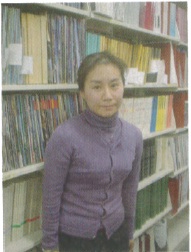Taeko Takayanagi — Linking education and development
Taeko Takayanagi (30) is Program Coordinator for Habitat for Humanity Japan, which focuses primarily on addressing housing issues for people in need, and previously worked for the Japan International Cooperation Agency (JICA) in Pakistan. She is originally from Ibaraki Prefecture.
What led you to a career in NGOs and in development work?
From a very young age, I wanted to be a schoolteacher, so I entered Bunkyo University to do a B.A. in Education, majoring in primary education. While I was a student, however, I traveled around Asia. I saw a lot of children in Thailand who should have been in school but, were instead selling various items on the street. That made me want to help children overseas, who are in much greater need of support than children in Japan.
Upon my return to Tokyo, I became a volunteer at the Society for Promoting Intercultural Education for Children, while still studying at university. I helped teach English and develop curricula and class materials. I also worked in a mobile library in Nepal in the summer of 1997.
What did you do after graduation?
I worked as a customer service assistant at Japan Telecom, handling payment transfers from customers, training staff, and assisting foreign customers. It wasn’t really what I wanted to do, but it gave me important office experience.
I then went to India for a couple of months to be an English teacher at an NGO. I taught English to children of the Santari and Pahariya tribes in the State of Bihar, in addition to assisting with the management of two schools and developing syllabi and materials. For my long-term career, though, I realized that I needed skills that I hadn’t acquired in college, so I went to Manchester University in the U.K. to do a Master’s in Education. I especially focused on the relationship between education and community development.
After returning to Japan, I worked at the Ibaraki International Association. I planned and implemented international exchange activities for children, organized a fund-raising program for Afghanistan, and managed workshops to raise public awareness of international development issues.
I understand that you worked for JICA in Pakistan. What was that like?
Before I went, I thought it might be very dangerous, but actually it was fine. My assignment was as a technical assistant on literacy education at the National Education Foundation. Working with one woman in particular, I helped develop strategies for monitoring and evaluating community schools, resolve administration and class-management issues, design teacher-training programs, and operate a women’s literacy center.
What did you learn from that experience?
I learned that local people are capable of doing what needs to be done, but they often lack the necessary experience and facilities. I was therefore able to share ideas and approaches that could then be adapted to the local environment. By the end of my two years there, my local counterpart had fully mastered the job.
Now you work at Habitat for Humanity Japan. What is that and what is your job?
Habitat for Humanity’s core mission is to build decent, reasonable housing for low-income individuals. Headquartered in Georgia, U.S.A., it is best known for former President Jimmy Carter’s involvement. Today it operates in about 100 countries.
In Japan, we are not able to build homes because of government regulations and the high cost of materials. Instead, we focus on training and sending volunteers to help build homes, under local construction supervisors, in India, Thailand, and other Asian countries.
I am involved in two projects. The first is a program to educate young people about Third World poverty issues. And the second is helping victims of the recent earthquake in Pakistan.
You seem very passionate about your work. Why is that?
The smiles of young children are what really motivate me. And I really enjoy working with people around the world and living and working in other cultures. Of course, some Japanese people think I am a little crazy, giving up the secure life of a Japanese schoolteacher and going to ‘dangerous’ countries like Pakistan. But this is how I enjoy life, and how I can realize my own personal growth and development.









